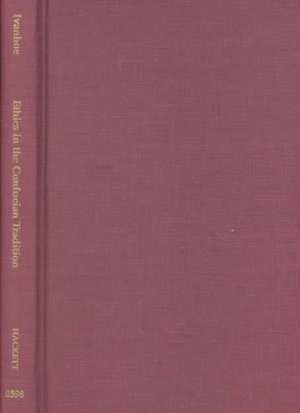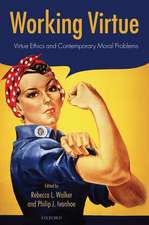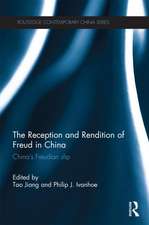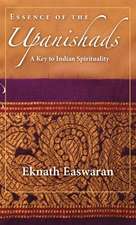Ethics in the Confucian Tradition: The Thought of Mengzi and Wang Yangming
Autor Philip J. Ivanhoeen Limba Engleză Hardback – 15 mar 2002
| Toate formatele și edițiile | Preț | Express |
|---|---|---|
| Paperback (1) | 120.90 lei 22-36 zile | +23.00 lei 5-11 zile |
| Hackett Publishing Company – 15 mar 2002 | 120.90 lei 22-36 zile | +23.00 lei 5-11 zile |
| Hardback (1) | 292.72 lei 22-36 zile | |
| Hackett Publishing Company – 15 mar 2002 | 292.72 lei 22-36 zile |
Preț: 292.72 lei
Preț vechi: 319.28 lei
-8% Nou
Puncte Express: 439
Preț estimativ în valută:
56.03€ • 60.88$ • 47.10£
56.03€ • 60.88$ • 47.10£
Carte disponibilă
Livrare economică 31 martie-14 aprilie
Preluare comenzi: 021 569.72.76
Specificații
ISBN-13: 9780872205987
ISBN-10: 0872205983
Pagini: 256
Dimensiuni: 9 x 215 x 20 mm
Greutate: 0.42 kg
Ediția:2 Rev ed.
Editura: Hackett Publishing Company
Colecția Hackett Publishing Company, Inc (US)
ISBN-10: 0872205983
Pagini: 256
Dimensiuni: 9 x 215 x 20 mm
Greutate: 0.42 kg
Ediția:2 Rev ed.
Editura: Hackett Publishing Company
Colecția Hackett Publishing Company, Inc (US)
Recenzii
This enlightening book is a comparative study of the moral and metaphysical theories of these two luminaries of the Confucian tradition. . . . Ivanhoe draws in masterful strokes the trajectory of the Confucian image of the sage, from the semi-divine creator heroes revered by Kongzi, to Mengzi's human exemplars of perfected self-cultivation, to Wang Yangming's concept of the innate sagehood of every human. --Rene Goldman, Pacific Affairs
Ivanhoe's fine book deserves a wide readership. It will interest scholars of Confucianism as well as those specializing in Chinese intellectual history. Two informative appendices, along with the excellent index (which includes the most important Chinese characters used in the book), make it a useful work for specialists. I also recommend this book to anyone concerned with comparative philosophy and to those currently working in virtue ethics. The latter will find many ideas and arguments within this book that resonate with, and perhaps complement, Western virtue ethics. --Victoria Harrison-Carter, Dao: A Journal of Comparative Philosophy
Ivanhoe's fine book deserves a wide readership. It will interest scholars of Confucianism as well as those specializing in Chinese intellectual history. Two informative appendices, along with the excellent index (which includes the most important Chinese characters used in the book), make it a useful work for specialists. I also recommend this book to anyone concerned with comparative philosophy and to those currently working in virtue ethics. The latter will find many ideas and arguments within this book that resonate with, and perhaps complement, Western virtue ethics. --Victoria Harrison-Carter, Dao: A Journal of Comparative Philosophy















